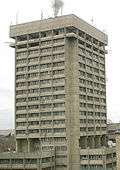Ministry of Communications and Information Technology (Afghanistan)
| دمخابیراتو وزارت | |
|
Seal of The Ministry of Communication and Information Technology (MICT) | |
|
Logo of The Ministry of Communication and Information Technology (MICT) | |
 The 18-story Ministry of Telecommunication is the tallest building in Kabul | |
| Ministry overview | |
|---|---|
| Formed | 1955 |
| Type | Ministry |
| Jurisdiction | Afghanistan |
| Headquarters | Kabul, Afghanistan |
| Minister responsible |
|
| Deputy Ministers responsible |
|
| Child agencies | |
| Website | Website of MICT |
The Ministry of Communications and Information Technology (MCIT) is an organ of the government of Afghanistan. Current communications minister is Abdul Raziq Wahidi.[1]
The Ministry of Communications and Information Technology provides an annual report to inform the public of advancements in Afghanistan's technological sector.[2] At the end of 2001, there were an estimated 35,000 phones working in all of Afghanistan serving a population of 27 million, one of the lowest teledesities in the world. Calls could only be completed over satellite facilities and only among Afghanistan's six major urban areas. The Ministry of Communications with international consulting aid developed a modern telecommunications and Internet sector policy published in October 2002. That policy framework is credited with laying the foundation for transparent, private sector-led competition. As of November 2009, there are more than 10.4 million mobile subscribers, a 300-fold increase in seven years. More than $1.2 billion has been invested in the sector.
In 2003 internationally funded advisers assisted with the drafting of a new Telecom Law which was adopted by Presidential Decree in December, 2005. An independent regulator was appointed June, 2006 and launched competitive tenders to license new telecom services.
The telecom sector lead economic reconstruction with four mobile service providers which cover 75% of the country with over 2,400 towers in more than 250 of the largest urban areas. 50,000 direct and indirect jobs were created by the sector.
There are 15 Internet Service Providers (ISP) licensed and operating in 20 major urban areas. Afghan Telecom, an Afghan government telecom company, was incorporated in September 2006; an 80% stake of the company is being privatize from 2008.
Currently there are an estimated 45,000 landlines and about 10,400,000 cellphone subscribers. While a number of ISPs offer services, the number of users has not been precisely researched yet.
See also
References
- 1 2 "Afghanistan to deploy 70pc e-govt systems in 2 years". Pajhwok Afghan News (PAN). January 11, 2016. Retrieved February 3, 2016.
- ↑ http://mcit.gov.af/en/page/12
External links
Coordinates: 34°31′9″N 69°10′32″E / 34.51917°N 69.17556°E
.png)
.png)